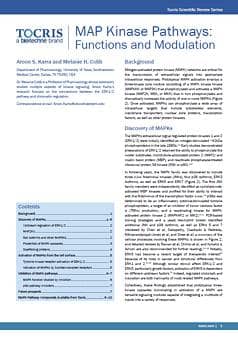MAPK Family
MAPKs (mitogen-activated protein kinases) are serine-threonine kinases that regulate a wide variety of cellular functions.
Six groups of MAPK have so far been identified:
- Extracellular signal-regulated kinases (ERK1, ERK2).
- c-Jun N-terminal kinases (JNKs)
- p38 isoforms (MAPK11, MAPK12, MAPK13, MAPK14)
- ERK5 (MAPK7)
- ERK3 (MAPK6) and ERK4 (MAPK4)
- ERK7/8 (MAPK15)
ERK 1 and ERK 2 transduce signals from growth factors and are key in regulating differentiation and proliferation in many cell types. Upon activation by MEK, ERK1 and 2 translocate to the nucleus where they phosphorylate transcription factors such as Elk1 and downstream kinases such as p90 RSK. JNK 1,2 and 3 (sometimes known as SAPKs or stress-activated kinases) and the p38 MAPKs (α-, β-, δ and γ- isoforms) are activated by UV irradiation, inflammatory cytokines and hyperosmolarity. The p38 MAPKs are also activated by lipopolysaccharide. Dysregulation of MAPK kinase pathways has been associated with various diseases including cancer (ERK), neurodegeneration (JNK) and inflammation (p38).
Literature for MAPK Family
Tocris offers the following scientific literature for MAPK Family to showcase our products. We invite you to request* your copy today!
*Please note that Tocris will only send literature to established scientific business / institute addresses.
MAPK Signaling Scientific Review
MAP kinase signaling is integral to the regulation of numerous cellular processes such as proliferation and differentiation, and as a result is an important focus of cancer and immunology research. Updated for 2016, this review discusses the regulation of the MAPK pathway and properties of MAPK cascades. Compounds available from Tocris are listed.
Pathways for MAPK Family
MAPK Signaling Pathway
The mitogen-activated protein kinase pathway evokes an intracellular signaling cascade in response to extracellular stimuli such as heat and stress. It can influence cell division, metabolism and survival.MAPK Gene Data
| Gene | Species | Gene Symbol | Gene Accession No. | Protein Accession No. |
|---|---|---|---|---|
| ERK1 | Human | MAPK3 | NM_001040056 | P27361 |
| Mouse | Mapk3 | NM_011952 | Q63844 | |
| Rat | Mapk3 | NM_017347 | P21708 | |
| ERK2 | Human | MAPK1 | NM_138957 | P28482 |
| Mouse | Mapk1 | NM_011949 | P63085 | |
| Rat | Mapk1 | NM_053842 | P63086 | |
| JNK1 | Human | MAPK8 | NM_139049 | P45983 |
| Mouse | Mapk8 | NM_016700 | Q91Y86 | |
| Rat | Mapk8 | L27129 | P49185 | |
| JNK2 | Human | MAPK9 | NM_139068 | P45984 |
| Mouse | Mapk9 | NM_016961 | Q9WTU6 | |
| Rat | Mapk9 | NM_017322 | P49186 | |
| JNK3 | Human | MAPK10 | NM_138982 | P53779 |
| Mouse | Mapk10 | NM_009158 | Q61831 | |
| Rat | Mapk10 | NM_012806 | P49187 | |
| p38α | Human | MAPK14 | NM_001315 | Q16539 |
| Mouse | Mapk14 | NM_011951 | P47811 | |
| Rat | Mapk14 | NM_031020 | P70618 | |
| p38β | Human | MAPK11 | NM_002751 | Q15759 |
| Mouse | Mapk11 | NM_011161 | Q9WUI1 | |
| p38δ | Human | MAPK13 | NM_002754 | O15264 |
| Mouse | Mapk13 | NM_011950 | Q9Z1B7 | |
| Rat | Mapk13 | NM_019231 | Q32Q45 | |
| p38γ | Human | MAPK12 | NM_002969 | P53778 |
| Mouse | Mapk12 | NM_013871 | O08911 | |
| Rat | Mapk12 | NM_021746 | Q63538 | |
| ERK5 | Human | MAPK7 | NM_002749 | Q13164 |
| Mouse | Mapk7 | NM_011841 | Q9WVS8 | |
| Rat | Mapk7 | AJ005424 | O89037 | |
| ERK3 | Human | MAPK6 | NM_002748 | Q16659 |
| Mouse | Mapk6 | NM_027418 | Q61532 | |
| Rat | Mapk6 | NM_031622 | P27704 | |
| ERK4 | Human | MAPK4 | NM_002747 | P31152 |
| Mouse | Mapk4 | NM_172632 | Q6P5G0 | |
| Rat | Mapk4 | NM_031622 | P27704 | |
| ERK7/8 | Human | MAPK15 | NM_139021 | Q8TD08 |
| Mouse | Mapk15 | NM_177922 | Q80Y86 | |
| Rat | Mapk15 | NM_173331 | Q9Z2A6 |

